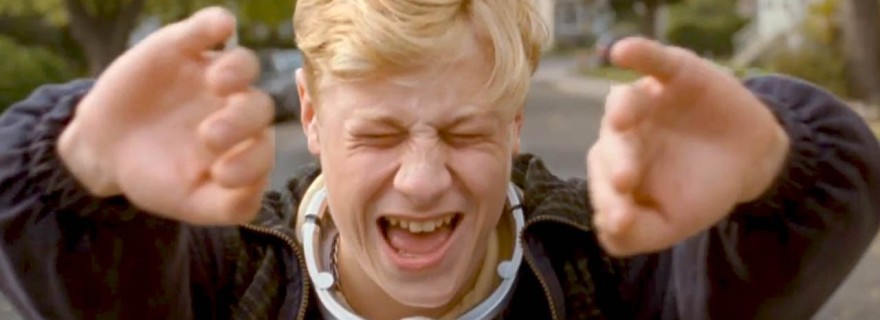'Mommy'
Movie Rating:
3.5
Ever since his prize-winning debut at the Cannes Film Festival five years ago (when he was only 20) with ‘I Killed My Mother’, Xavier Dolan has been a new enfant terrible of the art house. Button pushing, stylistically aggressive and obsessed with reviving the artiest of art house conventions, he’s been almost as annoying a filmmaker as he is a famous one. Thankfully, his latest prize-winning feature ‘Mommy’ is easily his best, and suggests that the young director has finally started to spot some of his shortcomings.
‘Mommy’ plays as somewhat of a remix of ‘I Killed My Mother’, taking similar elements and emerging with something far more truthful, meaningful and watchable. Anne Dorval stars as a struggling middle-age woman named Diane who’s stuck on a treadmill of failure. She dresses far too young, drinks a little too much, can’t quite control her emotions, and is always ready for a fight. In short, she’s a mess.
So is her son. Freshly released from an institution not willing to put up with his shenanigans, Antoine-Olivier Pilon plays the troubled young man. Diagnosed with ADHD and likely suffering from a few other brands of mental illness, son Steve has struggles with rage, maintaining focus, controlling his sexual urges, and has a tendency to explode with violence from time to time. However, when he’s in the right environment, he’s also a quite an intelligent and charming little sweetheart. Diane is forced to contain her son and pull her life back together simultaneously, which is obviously a bit much to handle on her own. So she asks the kindly teacher (Suzanne Clement) conveniently living across the street to help out with some home-schooling. Despite the fact that she’s taken a year off work to recover from a nervous breakdown, the teacher agrees and it does the boy some good. In fact, the three of them form a rather wonderful relationship and all seems right in the world… just in a far-too-perfect way that is destined to fall apart.
In the early going, Dolan spins his story through disarmingly dark humor. It’s not that he snidely mocks his characters, more that he has fun with their misery and the wildly unpredictable mood shifts of the troubled son at the center of everything. Emotional abuse runs rampant, rather openly and occasionally even physically in the endlessly aggressive Steve, and also far more subtly, sadly and neglectfully in how Diane deals with him (or doesn’t). It’s clear that the boy’s laundry list of problems is a result of his upbringing as much as his genetic conditions.
The mutually dependent and destructive bond between mother and son that Dolan presents is fresh, funny and heartbreaking. When their duo expands into a trio, the film only gets more complex. What starts with warmth and success for all involved soon gets downright weird. Steve’s hands have a tendency to roam freely amongst all women in his life, and a deeply perverse sexual tension builds up between all parties. Dolan and Pilon also keep the time bomb ticking on their protagonist, so even scenes of joy play out with a certain sense of dread and impending doom.
Yet, despite all of the perversions, excesses, raw emotion and mental illness on display, Dolan crafts a surprisingly warm, thoughtful and insightful character portrait in ‘Mommy’. The characters are richly complex and the way their lives play out feels heartbreakingly true. The performances from the three leads are astounding, and Dolan wisely gives them all room to play and explore. At times, the movie can feel like a vicious Todd Solondz suburban satire, while at other times it feels like a John Cassavetes uncompromising portrait of painful humanity. There’s a lot in play and much of it is fascinating, but unfortunately Dolan doesn’t quite know how to pull all the pieces together for the conclusion. Nor can he control his most irritating stylistic impulses.
The film plays at a long, meandering 2.5 hours and wraps up with a ludicrous fictionalized childcare law and a distressingly simplistic/abusive depiction of mental health facilities. The ending is both a deus ex machina and an irresponsible presentation of mental health care used purely for shock value. Dolan also frames the movie with the aspect ratio of a vertical cell phone video, which is simultaneously an interesting way to trap characters within their limited prospects as well as a distracting show-off stylistic tic. (The moment when the screen expands to 1.85 is either one of the most embarrassingly cheesy scenes of the year or a moving experiment, possibly both.)
‘Mommy’ is a massive leap forward in skill and maturity for the young filmmaker, yet also filled with examples of his most annoying directorial tendencies. Thankfully, the strengths of the former far outweigh the irritation of the latter, and Mommy emerges as quite an impressive little film. Hopefully, Dolan’s growth and maturity as an artist will only expand from here. The kid’s got talent, and he might even end up being a damn good director one day once he grows up.



